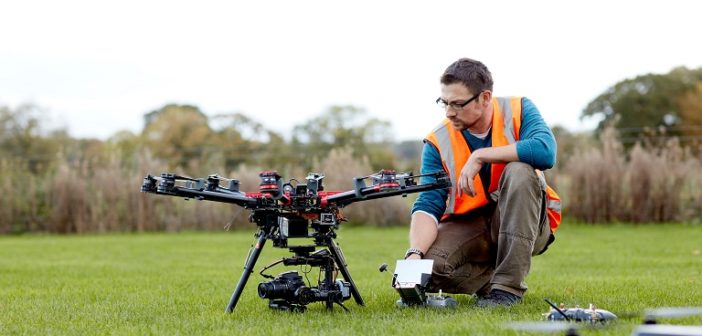Parliamentarians have been warned that bureaucracy and red tape are holding back the use of spray drones on agriculture – and that investment in the sector could unlock major benefits.
Harper Adams University Researcher Jonathan Gill, gave the warning to a meeting of the All-party Parliamentary Group on Science and Technology in Agriculture. Speaking to the audience of MPs, Peers and more, he outlined some of the opportunities the use of spray drones could present, including reducing fossil fuel intensive farming – and increasing the transparency of food provenance.
Drawing on the work which he has been doing at Harper Adams University’s Hands-Free Hectare, Mr Gill explained how drones can be used to distribute plant protection products – and some of the current regulatory burdens which are holding back their use.
The operational height for these drones is a few metres above the ground and from the crops – therefore these drones operate at a height well below the treeline and will not come in to conflict with an aircraft in airspace.
He said: “Instead, the regulatory issues we are facing are with the Health and Safety Executive and Chemicals Regulation Division, and are more about the products the drones are distributing.
“Yet used correctly, an operator or farmer can know where, when, and how much chemical is distributed to an area – which allows the provenance of the food produced to become ever more transparent – while, importantly, reducing chemical usage.
“Despite this being done in a much more targeted manner than some conventional delivery, there are still regulatory issues, both with the use of drones and with research.
“Drones, being fully electric, can also be charged by wind or solar – cutting the need for fossil fuels entirely and making significant reductions to the carbon footprint of any spraying – delivering further environmental benefits.”
During his presentation, Mr Gill also re-iterated the need for investment in getting smart spray and drone systems to the point where they are authorised for use – with testing and efficiency confirmation at the top of his priority lists.
He added: “I’m keen to talk to anyone to set out some of the issues which are holding back the sector in the UK – which is why I wanted to have this conversation with the All-Party group when I heard they were looking for advice from us.
“There were a number of interesting conversations following my presentation and I’m planning on keeping in touch with interested APPG members in the coming months.”
All-Party Group member Viscount Ridley, who is leading a Regulatory Horizons Council investigation into better regulation of drone technologies, welcomed Jonathan’s contribution to the session, outlining a number of areas where the UK’s ambition to be a global leader in precision agriculture does not appear to be matched by a proportionate regulatory approach.
He added that the information will be ‘extremely valuable in identifying options for a more enabling regulatory environment to support the safe and effective use of drone technology in agriculture’.




